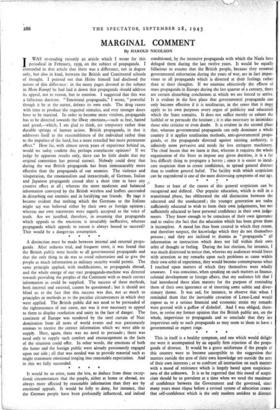A distinction must be made between internal and external propa-
ganda. After arduous trial, and frequent error, it was found that the British pubic were hostile to all governmental propaganda and that the only thing to do was to avoid exhortation and to give the people as much information as military security would permit. The same principle applied, with modifications, to propaganda abroad, and the whole energy of our vast propaganda-machine was directed towards providing the peoples of the Continent with as much correct information as could be supplied. The success of these methods, both internal and external, cannot be questioned ; but it should not blind us to the fact that this success was due, not so much to principles or methods as to the peculiar circumstances in which they were applied. The British public did not need to be persuaded of the righteousness of our cause, nor was it ever necessary to appeal to them to display resolution and unity in the face of danger. The continent of Europe was sundered by the steel curtain of Nazi domination from all news of world events and was passionately anxious to receive the correct information which we were able to supply. Here, again, there was no need to persuade ; there was need only to supply such comfort and encouragement as the facts of the situation could offer. In other words, the emotions of both the home and the foreign public were already passionately engaged upon our side ; all that was needed was to provide material such as might transmute emotional longing into reasonable expectation. And in this we fully succeeded. * * * *


























 Previous page
Previous page